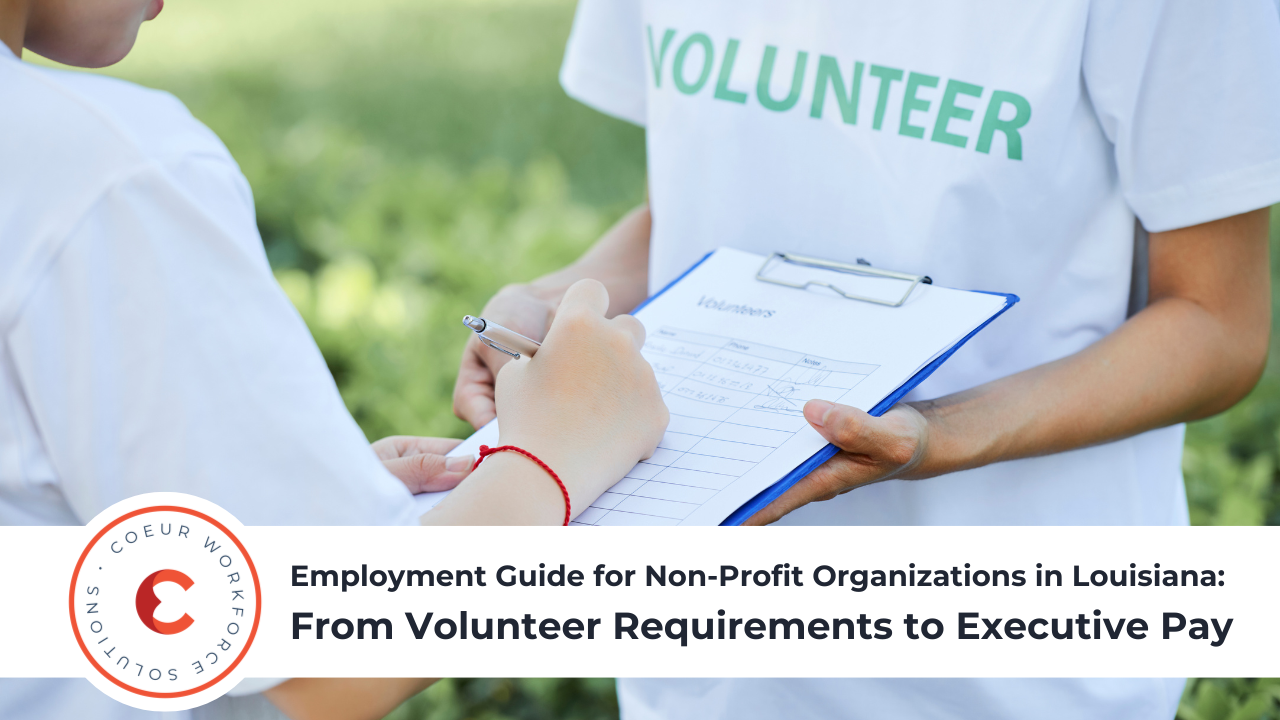Nonprofit organizations in Louisiana play a vital role in supporting communities and advancing various causes. However, managing employment practices within these organizations comes with unique challenges, especially regarding payroll, volunteer management, and executive compensation. This guide aims to provide nonprofits in Louisiana with the essential information they need to navigate volunteer requirements, payroll management, and compensation structures while maintaining compliance and transparency.
Volunteer Requirements
 Definition and Role of Volunteers
Definition and Role of Volunteers
Volunteers are vital to the operation and mission of non-profit organizations. Unlike employees, volunteers offer their services willingly without the expectation of monetary compensation. However, ensuring clarity in their roles and responsibilities is crucial to maintaining compliance with state and federal laws.
Legal Considerations
The Fair Labor Standards Act (FLSA) plays a significant role in defining the boundaries of volunteer work. Non-profits must be careful to avoid scenarios where volunteers are effectively performing the same duties as paid employees, as this could potentially violate labor laws. In Louisiana, additional state-specific regulations may apply, so it’s essential for non-profits to be familiar with these to avoid misclassification issues.
Best Practices for Managing Volunteers
To effectively manage volunteers, non-profits should implement clear guidelines that outline the scope of volunteer activities. This includes providing written descriptions, setting expectations, and offering proper training. Ensuring a positive and structured volunteer experience not only enhances productivity but also supports long-term volunteer retention. Utilizing volunteer management tools and maintaining detailed records can further bolster compliance and organizational efficiency.
Employee vs. Independent Contractor
Distinguishing between an employee and an independent contractor is a common challenge for nonprofits. This classification impacts payroll, tax responsibilities, and benefits. Employees typically receive regular wages and benefits, whereas independent contractors are paid per contract without receiving benefits. Nonprofits must assess criteria such as control over work hours and tasks, tools provided by the organization, and autonomy in decision-making to classify workers correctly. Misclassification can lead to legal complications and financial penalties, underscoring the importance of understanding these distinctions.
Beyond federal guidelines, non-profits in Louisiana need to be aware of state-specific employment laws. These may include regulations related to wages, working conditions, and employment rights. Non-compliance with these laws can result in legal repercussions that disrupt operations and tarnish public trust. Non-profits are advised to consult with legal or human resources experts to stay updated on changes to employment laws and to implement policies that align with both state and federal requirements.
Explore Expert Payroll Management Solutions for Your Nonprofit
Nonprofit Payroll Management
 Effective payroll management is crucial for non-profit organizations in Louisiana to ensure compliance with both federal and state regulations. This involves understanding tax obligations, utilizing specialized payroll services, maintaining accurate records, and adhering to specific filing requirements.
Effective payroll management is crucial for non-profit organizations in Louisiana to ensure compliance with both federal and state regulations. This involves understanding tax obligations, utilizing specialized payroll services, maintaining accurate records, and adhering to specific filing requirements.
Tax-Exempt Status and Payroll Taxes
Although non-profits enjoy tax-exempt status for income tax purposes, they are not exempt from payroll taxes. Organizations must fulfill federal obligations, including Social Security, Medicare, and federal unemployment taxes. Additionally, Louisiana requires non-profits to adhere to state payroll tax laws, including withholding income taxes and state unemployment taxes. Failure to accurately calculate and remit these taxes can result in penalties and interest, jeopardizing the organization’s financial standing. Non-profits should conduct regular audits of their payroll processes to ensure compliance with these tax obligations.
Utilizing Payroll Services
Partnering with specialized payroll services can streamline payroll processing and ensure compliance. These services handle tax calculations, filings, and reporting, reducing the administrative burden on non-profits. For instance, Coeur Workforce Solutions offers tailored payroll management solutions that can help non-profits focus on their mission while confidently managing their workforce.
Record-Keeping and Reporting
Maintaining detailed payroll records is a legal requirement. Non-profits must keep records of employee hours, wages, tax deductions, and benefits for at least three years. These records support financial audits and are necessary for reporting purposes.
Filing Requirements
Non-profits in Louisiana must adhere to specific filing requirements:
Federal Filings:
- Form 941: Employers must file this quarterly to report income taxes, Social Security, and Medicare taxes withheld from employees.
- Form 940: This annual form reports federal unemployment taxes.
State Filings:
- Form L-1: Louisiana employers use this quarterly form to report and pay state income tax withheld from employees.
- Form L-3: This form is used to transmit state withholding tax statements to the Louisiana Department of Revenue.
Adhering to these filing requirements is crucial to maintain compliance and avoid penalties.
By understanding and managing these aspects of payroll, non-profits in Louisiana can operate efficiently and focus on their mission-driven activities.
Get in Touch for Expert Nonprofit Solutions
Executive Compensation
Executive compensation in non-profit organizations must be handled with care and transparency. This aspect of human capital management is critical, as it affects not only the organization’s internal dynamics but also its public perception and donor relationships.
Setting Reasonable Compensation
Determining appropriate compensation for executives requires balancing fairness and market competitiveness while aligning with the organization’s mission. Non-profits should conduct market research to benchmark salaries against similar organizations, ensuring that compensation remains reasonable and justifiable. This proactive approach helps safeguard the organization from scrutiny and fosters trust among stakeholders.
IRS Regulations and Compliance
The IRS has specific regulations governing executive compensation in non-profits to prevent excessive pay that could jeopardize the organization’s tax-exempt status. Non-profits must document the decision-making process behind executive pay, including comparisons to industry standards and performance evaluations. Failure to comply with these regulations can lead to penalties and damage the organization’s reputation.
Transparency and Public Disclosure
Transparency is vital for non-profit organizations to build and maintain trust with donors, volunteers, and the public. Non-profits are required to disclose executive compensation details in their IRS Form 990 filings, which must accurately reflect all forms of compensation, including bonuses and deferred benefits. By prioritizing transparency, non-profits demonstrate their commitment to ethical financial management and accountability.
Conclusion
Navigating the employment landscape as a non-profit in Louisiana involves understanding key aspects such as volunteer management, employee classification, payroll practices, and executive compensation. By focusing on compliance with legal requirements and promoting transparency, non-profits can enhance their operational effectiveness and build trust within their communities.
Effective payroll management and reasonable executive pay practices are essential for maintaining financial health and integrity. Working with experts like Coeur Workforce Solutions can provide tailored support to help non-profits manage these important areas, allowing them to concentrate on their mission. By staying informed and proactive, non-profits can thrive and positively impact their communities while ensuring their practices uphold the highest standards of accountability.





